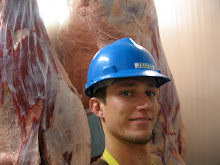
Our first full day in Ecuador started out with a trip to the US embassy. We were treated with a variety of speakers. We had Gene, the FAS advisor who helped plan this thing give us a quick overview of Ecuador agriculture. We met Gene in Peru a week ago when he gave a similar talk for Peru. Next we had a speaker talk about environmental issues and challenges in Ecuador. One interesting bit of information here is that the constitution has been changed many times, and that more recently in 2008 natural resources were given specific rights. The environmental laws have become stiff here in Ecuador, now only if they were being fully monitored and regulated- that's the tough part.
We had a US diplomat give us a history of the political climate of Ecuador. There have been 20 constitution changes since Ecuador was founded in 1830. Rafael Correa is the current president of Ecuador. Interestingly enough, Ecuador is keeping a very diverse portfolio when it comes to international ties. It keeps relations strong with Russia, Iran and other US-hating countries, also while keeping the US at an arm's distance. They think the US is too dominant in the world and want to keep the American influence to a minimum.
Next on the agenda was the Undersecretary of Agriculture. The class learned about how the land reform has severely hurt the productivity of farmers in Ecuador. They import a vast amount of food, although they have abundant land and water. The country is composed of a multitude of small farmers, small enough that efficiency is not very high and productivity is low. This results in a large amount of imports to the country. Subsidies from the government are the only thing keeping the farmers going. This in essence isn't exactly a bad thing though. It keeps a small amount of profit on the farms to decrease the amount of urban migration and poverty that is abundant in Lima, Peru. There are some large producers and those typically are the cocoa and banana producers. Coffee and corn producers are often very small. I view this small farm subsidy as an interesting form of welfare. Heck, it beats sitting around the TV all day watching Jerry Springer. Unfortunately, it hurts productivity and is very inefficient.
The final speaker at the embassy was Luis Bakker, president of PRONACA, the largest food company in Ecuador. Luis provided a fascinating insight into how Ecuador feeds itself, and the challenges it faces in agriculture. PRONACA produces 1,200 different products under 26 brands. They feel very socially responsible and look out for the small farmer. They help the farmer with purchasing them seed and fertilizer, and also buying their crop. This helps increase the efficiency of a typically very inefficient system. I was very impressed with this speaker, he surely had his act together.
We went to the hotel and had a speaker set up in the conference room. Jascivan Carvalho from Conservation in Action gave an eloquent talk of issues in the Amazon rainforest. Jascivan covered topics such as oil exploration, timber harvest, clear-cut agriculture and eco-tourism. This talk helped prepare us for our trip to the Amazon tomorrow.
We had a little free time, so Josh and I went on a mission- a soccer jersey from Ecuador. We walked down into the center of town, and I crossed the largest (and most complex) intersection I've ever seen in my life. How we survived nobody knows. Luckily, we found a sports store, only after asking around for soccer jerseys in broken Spanish which later we found out we were asking for soccer swimsuits. Ah, crazy gringos. I found the perfect soccer jersey- a keeper jersey (I am an indoor soccer player at Big League Dreams) from the Ecuadorian national team, and it was cheap too!
Back to the hotel, got cleaned up for a big reception at the US ambassador's house. I met a variety of people including Ambassador Hodges. There were many US diplomats available to greet the delegation of California farmers. Many people were very curious why we where in Ecuador. In fact, we had a large contingent of media at the event, snapping photos like paparazzi. Peter Vallis and I were interviewed by Betty Jumbo, the editor of Grupo El Comercio, the largest newspaper in Ecuador. I'll keep my eyes peeled for an article in this newspaper with the only words not in Spanish- "Peter Vallis" and "James Rickert." I'll need an interpreter to figure to see how bad I botched the interview. Ah, ignorance is bliss.
After an inspiring reception, we came back to the hotel just as the Miss Ecuador pageant contestants were arriving. Yes, you heard that right- Miss Ecuador was crowned tonight and we saw her. All of the contestants are staying at this hotel. Quite an interesting twist to a fascinating day. Tomorrow will begin with a long bus ride to the Amazon... I'm excited!


James, Thanks for all the writing and updates from Peru and Ecuador. I really enjoyed the experiences in the Balkans. I would be the early riser and walk a couple of miles each morning of the trip....
ReplyDeleteCheers
Garry Pearson